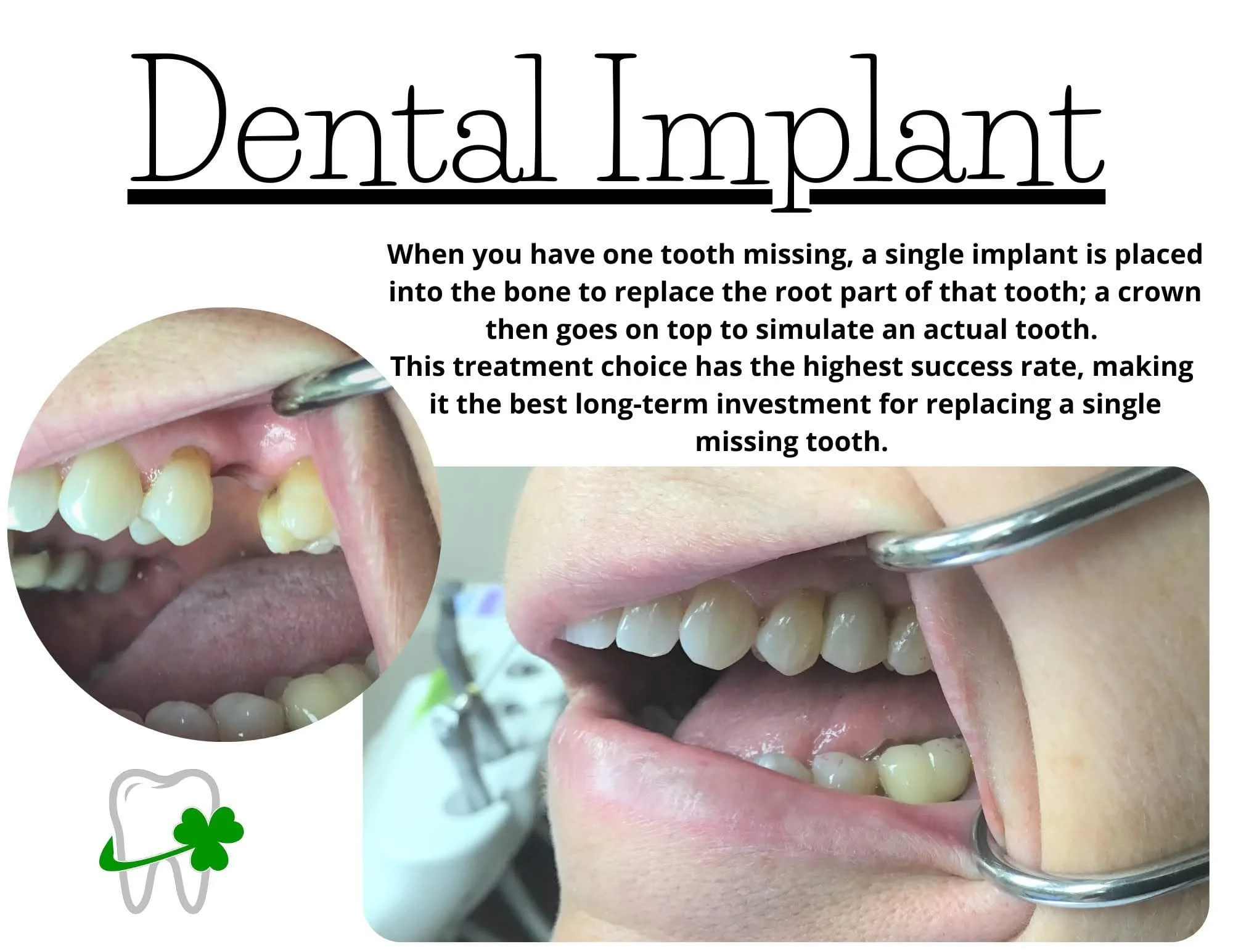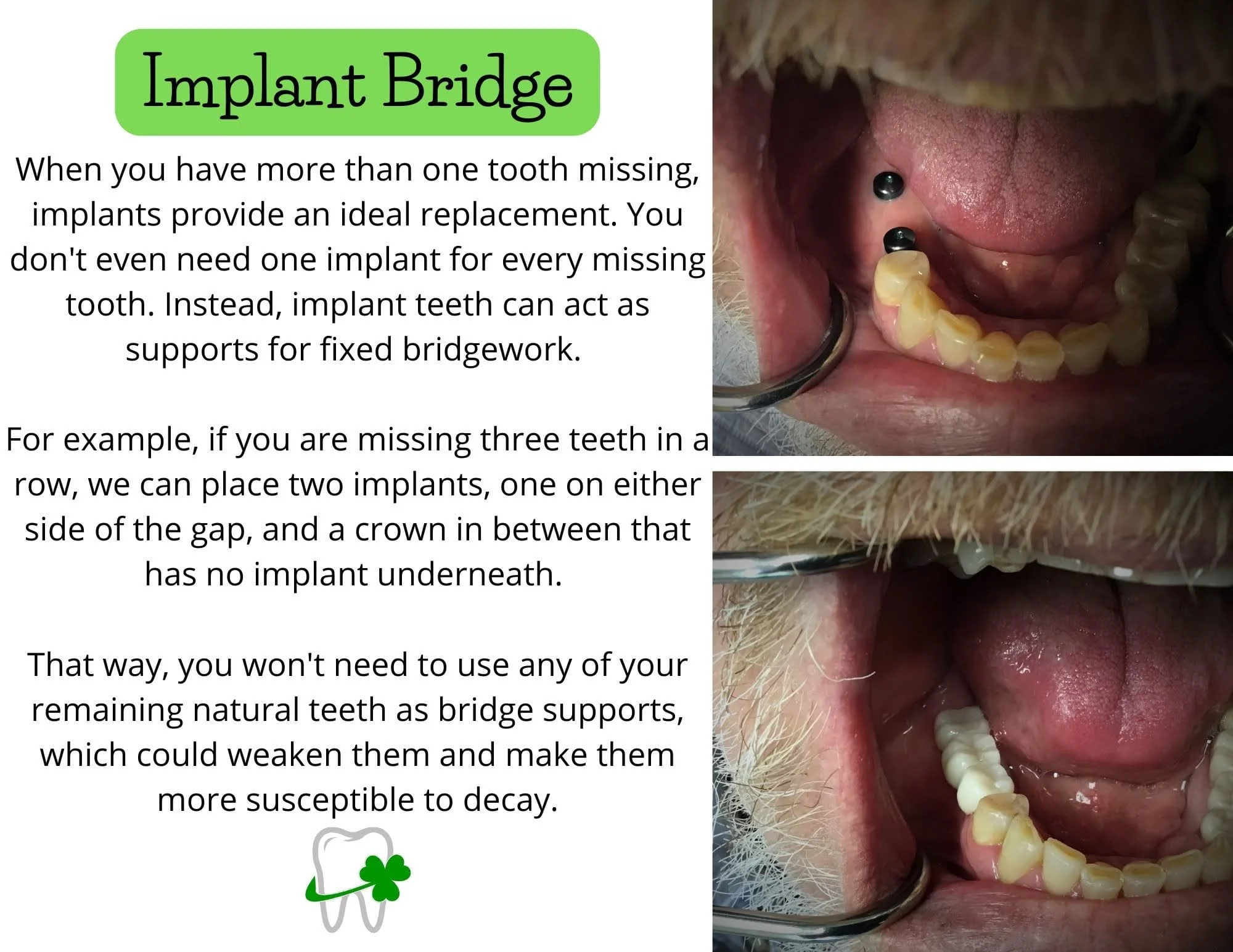What Are Dental Implants?
Of all the ways modern dentistry has to replace missing teeth, dental implants are by far the best. A dental implant most often takes the form of a small, screw-shaped titanium post that replaces the root-part of a missing tooth.
- There is no tooth-replacement option that will give you a longer-lasting result.
- Implants also help preserve tooth-supporting bone that naturally deteriorates when a tooth is lost.
- Loss of bone is one of the major hidden consequences of losing teeth.
Before
(Patient missing premolar tooth. )
After
(Restored patient's premolar with dental implant.)
How Do Dental Implants Work?
During a minor surgical procedure, your dental implant is inserted directly into the jawbone in the space vacated by the missing tooth. It will then be left to heal for a period of months before the final crown is attached. During this healing period, the implant actually fuses to the bone surrounding it. After a healing period, the implant is topped with a lifelike crown custom-made to match your existing natural teeth.
Are Dental Implants Painful?
- The surgical procedure used to place an implant is actually quite minor and routine, requiring only local anesthesia in most cases.
- Most people find dental implant surgery very easy to tolerate. Any post-operative discomfort can usually be managed with over-the-counter anti-inflammatory medication such as ibuprofen or OTC pain-relievers. Ice can also be helpful.
- Implants have a documented success rate of over 95%, which is significantly higher than any other tooth-replacement option.
Tooth Replacement Options Using Dental Implants
Implants can replace missing teeth in a variety of ways.
SINGLE DENTAL IMPLANT: REPLACES ONE TOOTH

When you have one tooth missing, a single implant is inserted into the bone to replace the root part of that tooth; a crown then goes on top to simulate an actual tooth. This treatment choice has the highest success rate, making it the best long-term investment for replacing a single missing tooth. Even if the initial cost is slightly higher than other options, it is the most cost-effective solution over time. An implant will never decay or need root canal treatment, and feels just like the tooth that was there.
FIXED IMPLANT BRIDGE: REPLACE MULTIPLE TEETH
(The featured case above is a three unit bridge completed by Dr. Jenifer K. Moser. Patient was extremely happy with the outcome to have back teeth to chew on!)
FIXED IMPLANT SUPPORTED DENTURES: REPLACE ALL TEETH PERMANENTLY
An implant-supported fixed denture is a naturalistic set of false teeth — finalized
with prosthetic gum tissue. Implant- supported fixed dentures stay in your mouth all the time.
Implant- supported fixed dentures can support an entire arch of upper or lower replacement teeth that are fixed into the mouth and are never removed. Sometimes the new teeth can be supported by as few as 4 implants.
It's comparable to the structure of a table, which only needs 4 legs to hold it up. In cases where jawbone density and volume have deteriorated, 5 or 6 implants might be needed to support a row of 10 to 12 teeth. Dental implant replacement teeth protect your jawbone, won't slip, and should last a lifetime.
REMOVABLE IMPLANT SUPPORTED DENTURES: ALSO KNOWN AS "SNAP-ON-DENTURES"
Removable implant-supported dentures (also known as Snap-On-Dentures) are comparable to traditional dentures. The main difference between traditional dentures and removable implant dentures is that rather than using adhesives to hold the denture in place, dental implants are used.
Implants can even make removable dentures more comfortable, effective and healthier to wear. Traditional dentures rest on the gums and put pressure on the underlying bone. This accelerates bone loss so that the jaw shrinks and the dentures slip, particularly on the bottom.
Today dentists can attach a removable denture onto implants, transferring that pressure into the bone structure rather than the bone surface. This prevents the dentures from slipping while you eat and speak, and preserves the bone directly beneath them.
How Do You Care for Dental Implants?
There are only two ways an implant can lose attachment to the bone and fail once it has successfully fused: poor oral hygiene or excessive biting forces. Poor oral hygiene and/or a lack of regular cleanings can lead to a destructive bacterial infection called peri-implantitis. Flossing and brushing your teeth on a daily basis, along with regular professional cleanings, can prevent this. Excessive biting forces can come from either a habit of clenching or grinding your teeth, or an insufficient number of implants to handle the forces generated by your bite. You should receive the correct number of implants so this does not happen. And if you have a habit of grinding or clenching your teeth, a nightguard will be recommended to protect your implants. After all, implants are a long-term investment in your smile, your health and your well-being, so it's best to protect your investment.
Are Dental Implants Expensive?
At the outset, implants are more expensive than other tooth-replacement methods such as dentures or bridgework. But they also last many years longer and in fact should never need replacement. So they offer the best, most cost-effective option when viewed as a long-term investment in your health, comfort and well-being.
Can My Body Reject a Dental Implant?
Strictly speaking, implants can't be rejected because they contain no living cells or genetically coded material. The titanium of which they are made is completely biocompatible, and allergies are extremely rare. But an implant can fail to integrate with the jawbone if an infection develops in the absence of good oral hygiene, or if it is subjected to biting forces too soon. However, this is rare; implants regularly achieve success rates in excess of 95%.
Am I a Candidate for Dental Implants?
There's a good chance that you are, but this can only be determined after a complete oral examination that includes x-rays of your jaws. Please schedule a consultation to begin the exciting process of restoring your smile and bite.
Implant Post-Op Instructions
Following surgery, the last thing you should have to worry about is a complication due to poor post-operative care. Good oral hygiene is essential to good and proper healing following implant placement. Here are a few tips to help ensure a smooth recovery after your implant is placed.
First 24 Hours
- FIRST AND FOREMOST - DO NOT DISTURB THE SURGICAL SITE
- A small amount of bleeding, discomfort, and swelling is normal
- Keep pressure on gauze, until gauzed is soaked, then change it out (you can remove gauze fully once bleeding has stopped (DO NOT sleep with it in your mouth) - if bleeding continues and you are unable to get it to stop, do not hesitate to call the office for further instructions
- Apply an ice pack to side of the face where implant was placed (10 minutes on, 10 minutes off for a couple hours) **ICE PACK FOR FIRST 24 HOURS ONLY
- Eat cold, soft foods
- Stay hydrated but DO NOT use a straw
- No spitting or rinsing
After 24 Hours
- Apply heat to side of the face where implant was placed (10 minutes on, 10 minutes off)
- Eat warm foods
- Salt water rinses 4-5 times daily
After 24+ Hours
- No smoking for at least 5 days after implant is placed
- Normal brushing after 2 days
- No strenuous exercise for 48 hour
- DO NOT BLOW YOUR NOSE OR EAT/CHEW ON SURGICAL SITE FOR 2 WEEKS
- Keep your follow-up appointments with us to ensure proper healing




